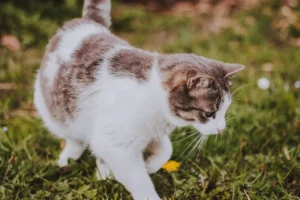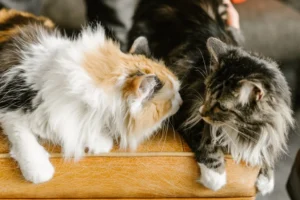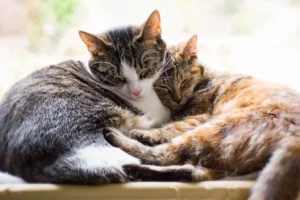Cats and boxes seem to go hand in hand, but have you ever wondered why? Let’s explore the fascinating reasons behind why cats are attracted to boxes.
Cats’ Instinctual Behavior:
Explore the instinctual behavior of cats that drives them to seek out enclosed spaces like boxes.
Cats have a natural instinct to seek out enclosed spaces as a way to protect themselves from potential threats. In the wild, small spaces offer a sense of security, allowing cats to hide from predators and stalk their prey without being seen. This instinctual behavior is deeply ingrained in domesticated cats, making them naturally drawn to cozy hideouts like boxes.
Additionally, cats are territorial animals, and boxes provide them with a designated space that they can claim as their own. This sense of ownership over a specific area can make cats feel more secure and in control of their environment. By seeking out enclosed spaces like boxes, cats are satisfying their primal need to establish and defend their territory.
Unique Insight: Providing your cat with a cozy box to retreat to can help reduce stress and anxiety, as it mimics the safe, enclosed spaces that cats instinctually seek out in the wild. This can be especially beneficial in multi-cat households or during times of change or upheaval in your cat’s routine.
Safe Haven or Hideout: Uncover why boxes provide a sense of security and comfort for our feline friends.
Boxes offer cats a safe haven where they can retreat, observe their surroundings, and relax without feeling exposed. The enclosed space of a box provides a sense of security by creating a physical barrier between the cat and any potential threats, helping them feel protected and at ease.
Moreover, the cozy confines of a box create a warm and comfortable environment for cats to curl up and rest. The small, enclosed space helps retain their body heat, making it a cozy spot for nap time. This sense of comfort and security is a major draw for cats seeking out boxes as their go-to hideout.
Territorial Nature: Cats are territorial creatures by nature, and boxes offer them a defined space that they can claim as their own. By curling up in a box, cats establish a territory where they can feel safe and secure. This territorial behavior is a key reason why cats are so attracted to boxes, as it taps into their innate need to mark their space and assert their presence.
Investigate how a box represents territory for cats and why they feel the need to claim it as their own.
Cats are natural hunters and predators, and their instinctual behavior drives them to seek out comfortable and safe spaces to claim as their own territory. Boxes provide a sense of security and seclusion that mimics the feeling of a cozy den or hiding spot in the wild. By curling up in a box, cats are able to monitor their surroundings while feeling protected from potential threats.
Additionally, cats are territorial animals that use scent marking as a way to establish their presence in a particular area. When a cat rubs against a box or scratches it with their claws, they are leaving their scent behind, effectively claiming the box as their own territory. This behavior is a way for cats to mark their space and communicate to other animals that this area is occupied.
In the wild, cats would seek out small, enclosed spaces to keep warm and protected from predators. The instinct to find a cozy, enclosed space is still present in domestic cats, making boxes an ideal choice for a comfortable nap or relaxation spot.
Temperature Preference:
Cats are known for their love of warmth, and boxes offer an insulated environment that helps cats regulate their body temperature. Cardboard boxes are great insulators, trapping the cat’s body heat inside and creating a cozy environment perfect for lounging.
When a cat curls up in a box, they can conserve body heat, which is especially beneficial for cats with short hair or those that live in colder climates. The enclosed space of a box provides a sense of security while also keeping the cat warm and comfortable.
In addition to warmth, boxes also provide a sense of privacy and seclusion that cats naturally seek out when resting or napping. This combination of warmth, insulation, and privacy makes boxes an irresistible spot for cats to relax and unwind.
Play and Exploration:
Curiosity and Play: Cats are inherently curious creatures, and boxes offer a new and exciting environment for them to explore. The enclosed space of a box triggers a cat’s natural instincts to investigate and play, providing mental stimulation and entertainment.
Hide and Seek: Boxes provide the perfect hiding spot for cats to play games of hide and seek. Cats love hiding in tight spaces and pouncing on unsuspecting toys or prey, making boxes a versatile playground for their hunting instincts.
Sensory Stimulation: The texture and smell of cardboard can also be appealing to cats, adding another layer of sensory stimulation to their playtime in a box. The crinkly sound of cardboard and the different textures engage their senses and keep them entertained for hours.
Safe Space: Boxes offer a safe and familiar environment for cats to retreat to when they feel stressed or overwhelmed. Having a cozy box to hide in can help cats feel secure and reduce anxiety, making it a valuable tool for their emotional well-being.
Remember, providing your feline friend with a variety of boxes in different shapes and sizes can enrich their environment and offer them a comfortable and stimulating space to call their own.
Discover how cats view boxes as a playground and an opportunity for exploration and entertainment.
When it comes to cats and their love for boxes, it all boils down to their natural curiosity and instinct for exploration. Cats are known for their playful nature, and a box presents the perfect setting for them to engage in fun and entertainment.
Boxes provide cats with a sense of security and privacy, allowing them to retreat to a cozy space where they can observe their surroundings while feeling safe. This enclosed environment taps into their wild instincts, making them feel like they are hidden away, ready to pounce on any unsuspecting prey that may pass by.
In addition, the different shapes and sizes of boxes offer cats a unique way to test their agility and flexibility. They can jump in and out, squeeze through tight spaces, and climb on top, creating a makeshift jungle gym that satisfies their innate need for physical activity.
So, the next time you see your feline friend lounging in a cardboard box, remember that to them, it’s not just a container—it’s a world of exploration and amusement waiting to be discovered.
- Provide a variety of box sizes and shapes for your cat to explore, from small shoeboxes to larger moving boxes.
- Add some toys or treats inside the box to entice your cat to investigate and play.
- Rotate the boxes regularly to keep your cat’s interest piqued and provide new opportunities for exploration.
Stress Relief:
Cats are known for their independent and mysterious nature, but they can also experience stress and anxiety, just like us humans. When faced with a challenging or overwhelming situation, cats often seek out small, enclosed spaces like boxes as a way to cope and calm themselves down.
Hiding in a box provides cats with a sense of security and comfort, allowing them to retreat from potential stressors in their environment. The enclosed space helps block out excess stimuli and creates a secluded area where they can relax and unwind.
If your cat is feeling anxious or overwhelmed, offering them a cozy box to retreat to can help them feel safe and secure. It’s like their personal fortress where they can take a breather and recharge before facing the world again. So, don’t be surprised if you find your furry friend nestled inside a box during times of stress—it’s their way of seeking solace and comfort.
Instinctual Hunting Behavior:
Cats are natural-born hunters, with a keen instinct for stalking and capturing prey. When a cat spots a box, they see it as an opportunity to hone their hunting skills and indulge in their primal instincts.
Boxes are reminiscent of hiding spots in the wild where cats can lay in wait for their unsuspecting prey. This instinctual behavior kicks in when they see a box, triggering their predatory drive and encouraging them to investigate and pounce.
So, when your cat dives headfirst into a box or starts batting at imaginary creatures inside, they are simply tapping into their innate hunting instincts. It’s a way for them to stay sharp, engage in play, and satisfy their natural drive to chase and catch their quarry.
The next time you catch your feline friend stalking a box with intense focus, remember that it’s not just a playful game to them—it’s a manifestation of their hunting instincts at work. Just make sure to keep a close eye on any poor unsuspecting sock or toy that may become their make-believe prey!
Explore how boxes mimic the natural hunting behavior of cats, allowing them to stalk and pounce on unsuspecting prey.
Cats have an innate instinct to hunt, and boxes provide the perfect opportunity for them to unleash their natural predator skills. When a cat gets into a box, it mimics the act of stalking prey, as they can hide, observe, and plan their attack on an unsuspecting target – whether it’s a toy or even a passing human foot. This behavior taps into their primal instincts, keeping them engaged and entertained.
Cognitive Stimulation: Learn how boxes can provide mental stimulation for cats, keeping their minds sharp and active.
Boxes aren’t just a cozy spot for cats to nap in; they also offer mental stimulation that keeps their brains sharp. As curious creatures, cats love exploring new environments, and boxes provide them with the perfect opportunity to investigate and navigate different spaces. This mental engagement helps prevent boredom and can even reduce stress or anxiety in some cats. So, the next time you see your feline friend diving into a box, know that they are getting a mental workout too!
Additional Insight:
Here are a few ways you can enhance the cognitive stimulation for your cat with boxes: 1. Rotate Boxes: Switch up the boxes you provide to keep things interesting and prevent your cat from getting bored. 2. Add Toys: Place toys inside the box for your cat to discover and play with, adding an extra layer of engagement. 3. Create Challenges: Cut holes in the box or place treats inside to create a fun puzzle for your cat to solve.
Discuss how boxes can serve as a substitute for cat furniture, offering a comfortable resting spot or scratching surface.
If you’ve ever been puzzled by your feline friend’s obsession with boxes, you’re not alone. Cats are naturally drawn to these confined spaces because they mimic the cozy, secure feeling of a den in the wild. But did you know that boxes can also serve as a practical substitute for cat furniture?
Cats love to scratch, and cardboard boxes provide the perfect surface for this essential behavior. By sinking their claws into the corrugated material, cats can satisfy their natural urge to scratch while also keeping their claws healthy and sharp. Additionally, boxes offer a comfortable resting spot for cats to curl up and relax, providing a sense of security and privacy that appeals to their instinctual need for safety.
So, next time you catch your cat napping in a box instead of their plush bed, know that they’re simply following their natural instincts to seek out comfortable hiding spots and scratching surfaces. Embrace their love for boxes as a simple yet effective way to fulfill their innate needs for comfort and security.
And remember, a simple cardboard box can sometimes be just as appealing to your cat as that expensive cat tree you splurged on – it’s all about giving your furry friend the space and tools they need to be their happy, healthy selves.
Did You Know?
- Cats’ love for boxes can be traced back to their instinctual behavior as hunters. In the wild, small, enclosed spaces provide cats with a sense of security and protection while they scope out potential prey.
- Some studies suggest that the presence of boxes can actually help reduce stress and anxiety in cats. The confined space allows them to feel safe and secure, leading to a more relaxed and content feline friend.
- While it may seem like a silly obsession to us, boxes can actually serve as a form of environmental enrichment for cats, stimulating their minds and providing opportunities for play and exploration.
- Even big cats like lions and tigers show similar behaviors when presented with boxes, proving that this quirky fascination is truly ingrained in the feline psyche.
Alex, a passionate animal lover, has experience in training and understanding animal behavior. As a proud pet parent to two dogs and three cats, he founded AnimalReport.net to share insights from animal experts and expand his knowledge of the animal kingdom.









